Honorary Organizations
What Organizations Should You Join?
 Ask yourself these questions to help clarify your interests.
Ask yourself these questions to help clarify your interests.
- What is the purpose of this particular honorary? Am I looking for an opportunity for involvement and/or recognition for scholastic achievement?
- Is the organization active? Are there opportunities for leadership and service in the organization? (contact the organization's student leaders or talk to current members)
- What do current members say about the organization?
- Does the honorary offer scholarships?
- Is the honorary well-established (i.e. easily recognizable to prospective employers)?
- Does the honorary have a strong national/parent organization?
- If the honorary is recognized in a specific academic field, does the honorary provide name recognition and/or networking opportunities in the field?
- If I put the honorary on my resume, and a prospective employer asks me about it, how will I respond?
- If an honorary is an active organization, do I have time to participate?
- Do I have room for multiple honoraries on my resume? Which honorary(ies) best fits my interests and goals?
For Parents
Students are often invited to join an honorary society. Parents frequently contact the university regarding legitimacy of organizations and the benefits of membership. Following is information you may find helpful:
In terms of assessing whether it's worthwhile for your student to join any group, our recommendation is to ask your student to consider why he or she wants to join the group and whether this group will meet your student's reason for joining. For most students, the reasons for participating in an organization are to share a particular interest, to meet like-minded students, and to advance personal or career knowledge and opportunities.
 In general, it seems not to be beneficial to have the name of an organization on a resume unless the student can also say that he or she participated in some active way. That participation might be serving as an officer, playing a role in planning or organizing events, or making a contribution to the development of the group through a committee.
In general, it seems not to be beneficial to have the name of an organization on a resume unless the student can also say that he or she participated in some active way. That participation might be serving as an officer, playing a role in planning or organizing events, or making a contribution to the development of the group through a committee.
Students sometimes believe that having a list of memberships on their resume will improve their chances when they apply for a job or for graduate school. Employers and graduate schools will be impressed with a good grade point average, and they will want evidence of how students contributed to the organizations to which they belonged. They will want to know what students learned from their activities.
Some groups suggest that membership in an honorary society helps in getting scholarships—the most important factors in receiving departmental and academic scholarships are grade point average, evidence of involvement, and the recommendation of a professor or an academic adviser. Advisers usually know about a range of scholarship opportunities; professors are likely to hear about the scholarships offered by their department.
The best suggestion for determining the value of any group would be for your student to get in touch with the person listed as the contact to find out what the group does and how your student feels about the person or people leading the organization. If the contact person can talk about planned activities and the organization's goals, see if they fit your student's interests.
You can find out if a group is a registered student organization on the University of Oklahoma campus by checking the Student Activities Office's list of registered student organizations.
You also can do a Web-based search for a national branch of the organization through any Internet search site (Yahoo, Netscape, AltaVista, Google, etc.) to find out about the organization's mission and goals and any national activities the student can participate in.
(SOURCE for this parent information: University of Minnesota)






